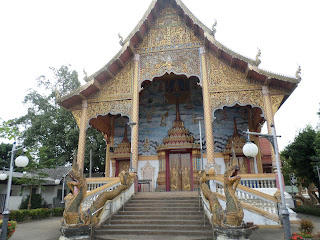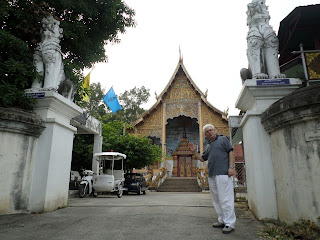 |
| Śrīla Bhaktisiddhānta Saraswati Ṭhakura |
শ্রী গৌड़िয-কন্ঠহার
Gaudiya Kanṭhahāra:
The Jeweled Necklace of the Gaudiya Vaishnavas
14th Jewel
The Jeweled Necklace of the Gaudiya Vaishnavas
14th Jewel
VARṆADHARMA-TATTVA
The Ontology of Social Classes
Being a compendium of quotations from revealed scriptures
concerning the truths about the cult of Chaitanya Mahāprabhu
Compiled under the authority and direction of
His Divine Grace
Bhaktisiddhānta Sāraswāti Goswāmī
Prabhupada
Translated and edited, with original Sanskrit and Bengali and Roman transliteration by
B. V. Mahāyogi, Michael Dolan
Being a compendium of quotations from revealed scriptures
concerning the truths about the cult of Chaitanya Mahāprabhu
Compiled under the authority and direction of
His Divine Grace
Bhaktisiddhānta Sāraswāti Goswāmī
Prabhupada
Translated and edited, with original Sanskrit and Bengali and Roman transliteration by
B. V. Mahāyogi, Michael Dolan
Who is a brahmana? Evidence from the Mahābhārata
१४.३४
शूद्रे चैतद्-भवेल्-लक्ष्म द्विजे तच् च न विद्यते
न वै शूद्रो भवेच्-छुद्रो ब्राह्मणो न च ब्राह्मणोः
14.34
śūdre caitad-bhavel-lakṣma dvije tac ca na vidyate
na vai śūdro bhavec-chudro brāhmaṇo na ca brāhmaṇoḥ
If it is seen that a śūdra has the characteristics of a brāhmaṇa he should be
considered a brāhmaṇa. Similarly, if a brāhmaṇa has the characteristics of a
śūdra he should be considered a śūdra.
(Mahābhārata, Vana Purva 180.25)
१४.३४
शूद्रे चैतद्-भवेल्-लक्ष्म द्विजे तच् च न विद्यते
न वै शूद्रो भवेच्-छुद्रो ब्राह्मणो न च ब्राह्मणोः
14.34
śūdre caitad-bhavel-lakṣma dvije tac ca na vidyate
na vai śūdro bhavec-chudro brāhmaṇo na ca brāhmaṇoḥ
If it is seen that a śūdra has the characteristics of a brāhmaṇa he should be
considered a brāhmaṇa. Similarly, if a brāhmaṇa has the characteristics of a
śūdra he should be considered a śūdra.
(Mahābhārata, Vana Purva 180.25)
Evidence From Śrīmad-Bhāgavatam
१४.३५
यस्य यल् लक्षणं प्रोक्तं पुंसो वर्णाभिव्यञ्जकम्
यद् अन्यत्रापि दृश्येत तत् तेनैव विनिर्दिशेत्
14.35
yasya yal lakṣaṇaṁ proktaṁ puṁso varṇābhivyañjakam
yad anyatrāpi dṛśyeta tat tenaiva vinirdiśet
If one shows the symptoms of being a brāhmaṇa, kṣatriya, vaiśya, or śudra, as
described above, even if he has appeared in a different caste, he should be
accepted according to those symptoms of classification. (Bhāg. 7.11.35)
१४.३५
यस्य यल् लक्षणं प्रोक्तं पुंसो वर्णाभिव्यञ्जकम्
यद् अन्यत्रापि दृश्येत तत् तेनैव विनिर्दिशेत्
14.35
yasya yal lakṣaṇaṁ proktaṁ puṁso varṇābhivyañjakam
yad anyatrāpi dṛśyeta tat tenaiva vinirdiśet
If one shows the symptoms of being a brāhmaṇa, kṣatriya, vaiśya, or śudra, as
described above, even if he has appeared in a different caste, he should be
accepted according to those symptoms of classification. (Bhāg. 7.11.35)
The Ancient commentator, Nīlakaṇṭha, on the
Conduct of Brāhmaṇas
१४.३६
एवञ्च सत्यादिकं यदि शूद्रोऽप्यस्ति तर्हिसोऽपि
ब्राह्मण एव स्यात् शूद्र लक्ष्मकादिकं न
ब्राह्मणोऽस्ति नापि ब्राह्मणलक्ष्मशमादिकं
शूद्रोऽस्ति.
शूद्रोऽपि शमाद्युपेतो ब्राह्मण एव, ब्राह्मणोऽपि
कामाद्युपेतः शूद्र एव
14.36
evañca satyādikaṁ yadi śūdro'pyasti tarhiso'pi
brāhmaṇa eva syāt śūdra lakṣmakādikaṁ na
brāhmaṇo'sti nāpi brāhmaṇalakṣmaśamādikaṁ
śūdro'sti.
śūdro'pi śamādyupeto brāhmaṇa eva, brāhmaṇo'pi
kāmādyupetaḥ śūdra eva
In the same way, if a śūdra has qualities like truthfulness then he is a
brāhmaṇa. And if a brāhmaṇa does not show the qualities such as peacefulness,
which are appropriate for a brāhmaṇa, then he is a śūdra. If a śūdra has
qualities like equananimity, then he is a brāhmaṇa. If a brāhmaṇa has qualities like lust, then he is a śūdra.
(Nīlakaṇṭha commentary on Mahābhārata, Vana Parva 180.23-26)
१४.३६
एवञ्च सत्यादिकं यदि शूद्रोऽप्यस्ति तर्हिसोऽपि
ब्राह्मण एव स्यात् शूद्र लक्ष्मकादिकं न
ब्राह्मणोऽस्ति नापि ब्राह्मणलक्ष्मशमादिकं
शूद्रोऽस्ति.
शूद्रोऽपि शमाद्युपेतो ब्राह्मण एव, ब्राह्मणोऽपि
कामाद्युपेतः शूद्र एव
14.36
evañca satyādikaṁ yadi śūdro'pyasti tarhiso'pi
brāhmaṇa eva syāt śūdra lakṣmakādikaṁ na
brāhmaṇo'sti nāpi brāhmaṇalakṣmaśamādikaṁ
śūdro'sti.
śūdro'pi śamādyupeto brāhmaṇa eva, brāhmaṇo'pi
kāmādyupetaḥ śūdra eva
In the same way, if a śūdra has qualities like truthfulness then he is a
brāhmaṇa. And if a brāhmaṇa does not show the qualities such as peacefulness,
which are appropriate for a brāhmaṇa, then he is a śūdra. If a śūdra has
qualities like equananimity, then he is a brāhmaṇa. If a brāhmaṇa has qualities like lust, then he is a śūdra.
(Nīlakaṇṭha commentary on Mahābhārata, Vana Parva 180.23-26)
Śrīdhara Svāmī's Opinion
१४.३७
शमादिभिरेव ब्राह्मणादि व्यवहारो मुख्यः न जातिमात्रात्.
यद् यदि अन्यत्र वर्णान्तरेऽपि दृश्येत, तद्- वर्णास्तरं
तेनैवे लक्ष्मण-निमित्तेनैववर्णेन विनिर्दिशेत्, न तु जातिनिमितेनेत्यर्थः
14.37
śamādibhireva brāhmaṇādi vyavahāro mukhyaḥ na jātimātrāt.
yad yadi anyatra varṇāntare'pi dṛśyeta, tad- varṇāstaraṁ
tenaive lakṣmaṇa-nimittenaivavarṇena vinirdiśet, na tu jātinimitenetyarthaḥ
The qualities of a brāhmaṇa, beginning with peacefulness (śamo, dama, tapaū,
etc.) represent the chief characteristics or principle behavior of a brāhmaṇa. On
the other hand, birth is no qualification for brahminical status. If one is seen to
take birth in another varṇa, but has the qualifications of a brāhmaṇa, his birth
should be disregarded and he should be accepted as a brāhmaṇa. One who is
born a brāhmaṇa may be accepted as a brāhmaṇa if he has the qualifications,
but otherwise he should not.
(Bhāvārtha-dīpikā commentary on Śrīmad Bhāgavatam 7.11.35)
१४.३७
शमादिभिरेव ब्राह्मणादि व्यवहारो मुख्यः न जातिमात्रात्.
यद् यदि अन्यत्र वर्णान्तरेऽपि दृश्येत, तद्- वर्णास्तरं
तेनैवे लक्ष्मण-निमित्तेनैववर्णेन विनिर्दिशेत्, न तु जातिनिमितेनेत्यर्थः
14.37
śamādibhireva brāhmaṇādi vyavahāro mukhyaḥ na jātimātrāt.
yad yadi anyatra varṇāntare'pi dṛśyeta, tad- varṇāstaraṁ
tenaive lakṣmaṇa-nimittenaivavarṇena vinirdiśet, na tu jātinimitenetyarthaḥ
The qualities of a brāhmaṇa, beginning with peacefulness (śamo, dama, tapaū,
etc.) represent the chief characteristics or principle behavior of a brāhmaṇa. On
the other hand, birth is no qualification for brahminical status. If one is seen to
take birth in another varṇa, but has the qualifications of a brāhmaṇa, his birth
should be disregarded and he should be accepted as a brāhmaṇa. One who is
born a brāhmaṇa may be accepted as a brāhmaṇa if he has the qualifications,
but otherwise he should not.
(Bhāvārtha-dīpikā commentary on Śrīmad Bhāgavatam 7.11.35)
Mahāprabhu's Definition of Who is and Isn't a
Brāhmaṇa: Envy has no place in the heart of a brahmana
১৪.৩৮
সহজে নির্মল এই ঽব্রাহ্মণঽ-হৃদয কৃষ্ণের ৱসিতে এই যোগ্য-স্থান হয
ঽমাৎসর্যঽ-চণ্ডাল কেনে ইহান্ ৱসাইলে পরম পৱিত্র স্থান অপৱিত্র কৈলে
14.38
sahaje nirmala ei 'brāhmaṇa'-hṛdaya kṛṣṇera vasite ei yogya-sthāna haya
'mātsarya'-caṇḍāla kene ihān vasāile parama pavitra sthāna apavitra kaile
The heart of a brāhmaṇa is by nature very clean; therefore it is a proper place for Kṛṣṇa to sit. Why have you allowed envy to sit there? Because of this , you have become like a caṇḍāla, the lowest of men, and you have also contaminated
a most purified place: your heart.
(Cc. Madhya 15.274-275)
১৪.৩৮
সহজে নির্মল এই ঽব্রাহ্মণঽ-হৃদয কৃষ্ণের ৱসিতে এই যোগ্য-স্থান হয
ঽমাৎসর্যঽ-চণ্ডাল কেনে ইহান্ ৱসাইলে পরম পৱিত্র স্থান অপৱিত্র কৈলে
14.38
sahaje nirmala ei 'brāhmaṇa'-hṛdaya kṛṣṇera vasite ei yogya-sthāna haya
'mātsarya'-caṇḍāla kene ihān vasāile parama pavitra sthāna apavitra kaile
The heart of a brāhmaṇa is by nature very clean; therefore it is a proper place for Kṛṣṇa to sit. Why have you allowed envy to sit there? Because of this , you have become like a caṇḍāla, the lowest of men, and you have also contaminated
a most purified place: your heart.
(Cc. Madhya 15.274-275)
The Evidence of the Smṛti
१४.३९
एतन् मे संशयं देव वद भूतपतेऽनघ
त्रयो वर्णाः प्रकृत्येह कथं ब्राह्मण्यमाप्नुयुः
स्थितो ब्राह्मण-धर्मेण ब्राह्मण्यम्- उपजीवति
क्षत्रियो वाथ वैश्यो वा ब्रह्म-भूयं स गच्छति
14.39
etan me saṁśayaṁ deva vada bhūtapate'nagha
trayo varṇāḥ prakṛtyeha kathaṁ brāhmaṇyamāpnuyuḥ
sthito brāhmaṇa-dharmeṇa brāhmaṇyam- upajīvati
kṣatriyo vātha vaiśyo vā brahma-bhūyaṁ sa gacchati
[Umā said] "O Śiva, master of the bhūtas. O sinless one, through what kind of
personal characteristics can the three classes of men kṣatriya, vaiśya, and śūdra
become brāhmaṇas? Is it possible for them to become brāhmaṇas? Please
enlighten my doubts on this subject." Śiva said, "If a kṣatriya or vaiśya is
established in brahminical behavior, and spends his whole life in brahminical
conduct, it is seen that such a person has attained brahminical status.
(Mahābhārata, Anuśāsana Parva 14.3.5,8)
१४.३९
एतन् मे संशयं देव वद भूतपतेऽनघ
त्रयो वर्णाः प्रकृत्येह कथं ब्राह्मण्यमाप्नुयुः
स्थितो ब्राह्मण-धर्मेण ब्राह्मण्यम्- उपजीवति
क्षत्रियो वाथ वैश्यो वा ब्रह्म-भूयं स गच्छति
14.39
etan me saṁśayaṁ deva vada bhūtapate'nagha
trayo varṇāḥ prakṛtyeha kathaṁ brāhmaṇyamāpnuyuḥ
sthito brāhmaṇa-dharmeṇa brāhmaṇyam- upajīvati
kṣatriyo vātha vaiśyo vā brahma-bhūyaṁ sa gacchati
[Umā said] "O Śiva, master of the bhūtas. O sinless one, through what kind of
personal characteristics can the three classes of men kṣatriya, vaiśya, and śūdra
become brāhmaṇas? Is it possible for them to become brāhmaṇas? Please
enlighten my doubts on this subject." Śiva said, "If a kṣatriya or vaiśya is
established in brahminical behavior, and spends his whole life in brahminical
conduct, it is seen that such a person has attained brahminical status.
(Mahābhārata, Anuśāsana Parva 14.3.5,8)
The Verdict of the Mahābhārata on the Occupation of Brāmaṛas
१४.४० .४१
साम्प्रतं च मतो मेऽसि ब्राह्मणो नात्र संशयः
ब्राह्मणः पतनीयेषु वर्तमानो विकर्मसु यस्
तु शूद्रो दमे सत्ये धर्मे च सततोथितह्
तं ब्राह्मणम् अहं मन्ये वृत्तेन हि भवेद्- द्विजः
14.40 .41
sāmprataṁ ca mato me'si brāhmaṇo nātra saṁśayaḥ
brāhmaṇaḥ patanīyeṣu vartamāno vikarmasu yas
tu śūdro dame satye dharme ca satatothitah
taṁ brāhmaṇam ahaṁ manye vṛttena hi bhaved- dvijaḥ
(The brāhmaṇa told the "hunter"), "In my opinion, you are a brāhmaṇa. Of this
there is no doubt. It is my consideration that the brāhmaṇa who is proud and
addicted to sin, who is full of vice and always engaged in evil and degraded
practices, is certainly a śūdra. On the other hand, a śūdra who is endowed with
the virtues of righteousness, self-restraint, and truthfulness is, in my opinion, a
brāhmaṇa. The only qualifications for brahminical status are truthful character
and saintly behaviour.
(Mahābhārata, Vana Parva 215.13-15)
१४.४२ .४३
हिंसानृत-प्रिया लुब्धाः सर्व-कर्मोपजीविनः कृष्ण
शौचपरिभ्रष्ठास् ते द्विजाः शूद्रतां गताः
सर्व-भक्ष्यरतिर् नित्यं सर्व-कर्मकरो ऽशुचिः
त्यक्त-वेदस् त्व् अनाचारः स वै शूद्र इति स्मृतः
14.42 .43
hiṁsānṛta-priyā lubdhāḥ sarva-karmopajīvinaḥ kṛṣṇa
śaucaparibhraṣṭhās te dvijāḥ śūdratāṁ gatāḥ
sarva-bhakṣyaratir nityaṁ sarva-karmakaro 'śuciḥ
tyakta-vedas tv anācāraḥ sa vai śūdra iti smṛtaḥ
Brāhmaṇas who live a life of violence, lies, and greed, who are impure and
indulge in all kinds of karmic activity in order to maintain their lives are
degraded to the status of śūdras. Such a person, who eats anything and
everything without discrimination, who is attached to worldly things, who will
accept any occupation just to make money, who has given up Vedic dharma and
proper behaviour is called a śūdra.
(Mahābharata, Śānti Parva 189.7)
१४.४० .४१
साम्प्रतं च मतो मेऽसि ब्राह्मणो नात्र संशयः
ब्राह्मणः पतनीयेषु वर्तमानो विकर्मसु यस्
तु शूद्रो दमे सत्ये धर्मे च सततोथितह्
तं ब्राह्मणम् अहं मन्ये वृत्तेन हि भवेद्- द्विजः
14.40 .41
sāmprataṁ ca mato me'si brāhmaṇo nātra saṁśayaḥ
brāhmaṇaḥ patanīyeṣu vartamāno vikarmasu yas
tu śūdro dame satye dharme ca satatothitah
taṁ brāhmaṇam ahaṁ manye vṛttena hi bhaved- dvijaḥ
(The brāhmaṇa told the "hunter"), "In my opinion, you are a brāhmaṇa. Of this
there is no doubt. It is my consideration that the brāhmaṇa who is proud and
addicted to sin, who is full of vice and always engaged in evil and degraded
practices, is certainly a śūdra. On the other hand, a śūdra who is endowed with
the virtues of righteousness, self-restraint, and truthfulness is, in my opinion, a
brāhmaṇa. The only qualifications for brahminical status are truthful character
and saintly behaviour.
(Mahābhārata, Vana Parva 215.13-15)
१४.४२ .४३
हिंसानृत-प्रिया लुब्धाः सर्व-कर्मोपजीविनः कृष्ण
शौचपरिभ्रष्ठास् ते द्विजाः शूद्रतां गताः
सर्व-भक्ष्यरतिर् नित्यं सर्व-कर्मकरो ऽशुचिः
त्यक्त-वेदस् त्व् अनाचारः स वै शूद्र इति स्मृतः
14.42 .43
hiṁsānṛta-priyā lubdhāḥ sarva-karmopajīvinaḥ kṛṣṇa
śaucaparibhraṣṭhās te dvijāḥ śūdratāṁ gatāḥ
sarva-bhakṣyaratir nityaṁ sarva-karmakaro 'śuciḥ
tyakta-vedas tv anācāraḥ sa vai śūdra iti smṛtaḥ
Brāhmaṇas who live a life of violence, lies, and greed, who are impure and
indulge in all kinds of karmic activity in order to maintain their lives are
degraded to the status of śūdras. Such a person, who eats anything and
everything without discrimination, who is attached to worldly things, who will
accept any occupation just to make money, who has given up Vedic dharma and
proper behaviour is called a śūdra.
(Mahābharata, Śānti Parva 189.7)




















